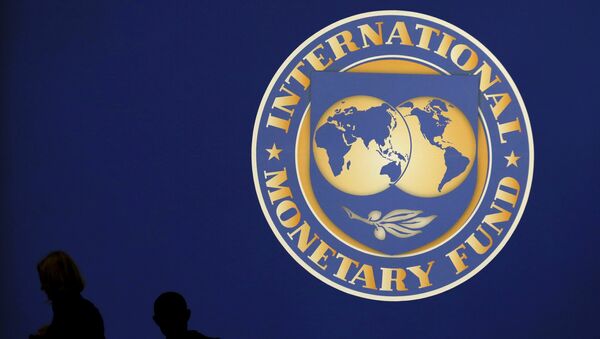In an annual review of China's economic policies, released on Friday, the International Monetary Fund (IMF) stood by its asessment that the value of the yuan was "broadly in line" with economic fundamentals, thus questioning the Trump administration's declaration that Beijing is manipulating its currency to gain "unfair competitive advantage in international trade".
The IMF said in the document that China took steps to bolster the value of its currency after the renminbi tumbled between mid-June and early August 2018. In general, the Chinese currency "was broadly stable" last year, decreasing in value by 2.5 percent against a basket of foreign currencies.
James Daniel, the IMF's mission chief for China, told reporters that the Fund's staff concluded the renminbi's value in 2018 was "broadly in line with medium-term fundamentals and desirable policies, i.e. not significantly over- or undervalued".
The IMF analysis was made public on 9 August — just four days after the US Treasury Department labelled China a "currency manipulator" in a move which will likely intensify already existing tensions between Beijing and Washington.
It was also announced that US Treasury Secretary Steven Mnuchin would engage with the IMF to "eliminate the unfair competitive advantage created by China's latest actions".
U.S. Treasury Designates China as a Currency Manipulator: https://t.co/Ndu7vtF3wO
— Treasury Department (@USTreasury) 5 августа 2019 г.
The decision came shortly after the People's Bank of China (PBoC) allowed the managed exchange rate to depreciate beyond 7 renminbi to the dollar for the first time in 11 years, causing financial markets to tumble.
The PBoC explained that the decline was triggered by "unilateralism and trade protectionism measures and the imposition of tariff increases on China".
China dropped the price of their currency to an almost a historic low. It’s called “currency manipulation.” Are you listening Federal Reserve? This is a major violation which will greatly weaken China over time!
— Donald J. Trump (@realDonaldTrump) 5 августа 2019 г.
US President Donald Trump, meanwhile, said that he would not devalue the dollar amid the ongoing trade war with Beijing even though he tweeted on 8 August that he was not "thrilled with our very strong dollar".
The following day, he told a press conference at the White House that "we don't have to" devalue the American currency since "we have such a strong dollar".
"The problem is our dollar is at a level that it makes it hard. But the advantage to doing what we have is money is pouring in because we have the safest currency in the world. We have the standard of the world. But because it's so strong, it's gotten so strong because other countries have problems. It makes it harder for our manufacturers", he elaborated.
POTUS added that if the Federal Reserve cut interest rates it would automatically bring down the US dollar "a little bit" and make it easier for companies.
....John Deere, our car companies, & others, to compete on a level playing field. With substantial Fed Cuts (there is no inflation) and no quantitative tightening, the dollar will make it possible for our companies to win against any competition. We have the greatest companies...
— Donald J. Trump (@realDonaldTrump) 8 августа 2019 г.
....in the world, there is nobody even close, but unfortunately the same cannot be said about our Federal Reserve. They have called it wrong at every step of the way, and we are still winning. Can you imagine what would happen if they actually called it right?
— Donald J. Trump (@realDonaldTrump) 8 августа 2019 г.
Tariffs and Trump's Trade War
The yuan's sharp decline followed Trump's announcement that he would impose a 10 percent tariff on another $300 billion worth of Chinese goods starting 1 September — he has already slapped a 25 percent duty on $250 billion worth of Chinese products.
In the report, the IMF has as well noted that if Trump were to introduce 25 percent tariffs on the $300 billion in Chinese imports, it would have reduced Beijing's growth by around 0.8 percentage points over the following 12 months. Since POTUS announced that he would impose a 10 percent duty instead, the decline is estimated to be about 0.3 percentage points.
The Chinese Foreign Ministry has promised to come up with countermeasures against the US new penalties, at the same time stressing that tariffs are not a "constructive" way to resolve the trade dispute.
The world's two biggest economies have been engaged in a trade war since June 2018 when President Trump announced he was introducing tariffs on $50 billion worth of Chinese foods to fix what he described as "unfair trade practices". Since then, both sides have exchanged several rounds of tit-for-tat measures.




